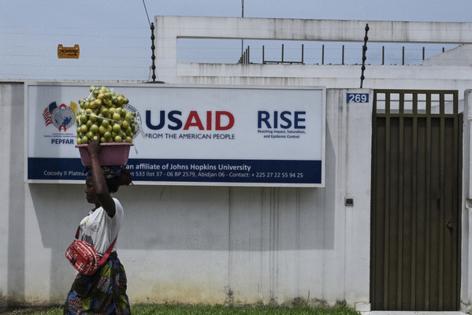Commentary: I worked for USAID for 16 years. I saw the profound difference it made
Published in Op Eds
This month marked the end of my 16-year career with the U.S. Agency for International Development’s Bureau for Humanitarian Assistance. Like thousands of other federal workers, I was dismissed without warning or explanation. In my time at USAID, I led response teams helping people during wars and after natural disasters around the world, on behalf of the U.S. government and the American people. My teams were the face of lifesaving U.S. assistance to affected communities, nonprofit organizations and other donor countries. I hosted Republican and Democratic members of Congress and their staff overseas. My colleagues and I have put our lives at risk in order to save lives around the world, in service of both Democratic and Republican administrations.
Since Jan. 20, USAID has been painted as wasteful and excessive. Here’s the truth: What USAID does is actually the minimum. USAID’s humanitarian bureau lets people know they aren’t alone during their worst moments, helps them survive and helps them fare better the next time disaster strikes. Remember the worst time in your life: Did you lose your home, or a family member, or survive a flood or a fire? Do you remember what helped? Maybe it was someone giving you a place to stay until you could get back on your feet or a neighbor bringing food so you didn’t have to cook in your grief. Or maybe it was someone offering a gift card for the grocery store, someone saying, “Your kids are safe,” while you went to find work or shelter, or someone feeding your kids because what you could afford wouldn’t be enough to go around.
Have you done these kindnesses for someone else? Of course you have. That’s what USAID does; it’s that basic. USAID says, “The American people are with you and are here to help,” and then USAID helps communities to help each other. It cannot be said enough how little this costs, how universal and human this is.
I’ve been privileged to represent the U.S. at its best, to work alongside the smartest, most compassionate, most professional people I’ve ever met, all trying to make life a little less difficult for their fellow humans. My team supported public health workers coordinating across conflict lines in the middle of a civil war to vaccinate Syrian kids against polio, reaching every kid when everyone thought it was impossible. I found myself close to tears watching trucks of food cross the border into Syria, knowing the months and layers of delicate negotiations required to allow such a simple delivery of food to people in need. I met Ukrainians fleeing across the border into Slovakia in the first days after Russia’s full-scale invasion, and the hundreds of strangers mobilized to support and welcome them. I met families who fled the eruption of Mount Mayon in the Philippines, who survived because they had enough warning to make it to safety before the volcano erupted, because of the support that my office had provided for early warning technology.
As basic as this assistance is, it is also incredibly complex to get right. Humanitarian aid is a field guided by decades of lessons learned, led by professionals, and dependent on trust and relationships in some of the riskiest areas in the world. This expertise and these relationships and lessons are being literally and deliberately erased.
We can debate whether the world should be so dependent on U.S. assistance. In fact, we do, and my colleagues and I lead those conversations with other donor countries, pushing other donors to take on more. Or we did. Our global humanitarian leadership gave us the leverage and credibility to urge other donors to give more. We led global technical discussions about how to be more effective, and we led global efforts to improve humanitarian aid, including its efficiency. With each administration, we expect a review and changes. The current dismantling of USAID’s work was not based on any debate and only a pretense of a post hoc review process based on lies and without consultation. Halting all programs, followed by inconsistent and unclear reinstatement of some, followed by further canceling, is quite simply cruelty.
It’s cruel to millions of people around the world reliant on basic food and health care funded by USAID. It’s cruel to U.S. farmers and shipping companies losing income as the administration disrupts the pipeline of food assistance from U.S. farms to families in need overseas. And it’s cruel to Americans who want to feel proud of the way we treat our fellow humans.
USAID was the blueprint for this administration’s threat to the whole federal government. What I’ve experienced these last eight weeks is personal but is also so much bigger than I am and bigger than USAID. In the midst of the reckless dismantling of lifesaving work and the mass firing of federal workers, Americans who care about the work done in their name, and the services being stopped in their name, have a role to play: Do not be overwhelmed, since that is what the administration wants.
Use your indignation, and your humor, and your creativity, to unite against the cruelty. The administration has written a cynical script, and USAID was Act 1. But instead of watching it play out, we can insert ourselves and rewrite the script right in front of them. Collectively, those resisting and those questioning and those speaking the truth and those standing up for kindness are a character they didn’t anticipate, so take the stage and find your light and help rewrite the script. The administration’s biggest triumph would be our silence.
____
Gavi Rosenthal, a Chicagoan, lost her position recently at the U.S. Agency for International Development after 16 years of service.
___
©2025 Chicago Tribune. Visit at chicagotribune.com. Distributed by Tribune Content Agency, LLC.




























































Comments